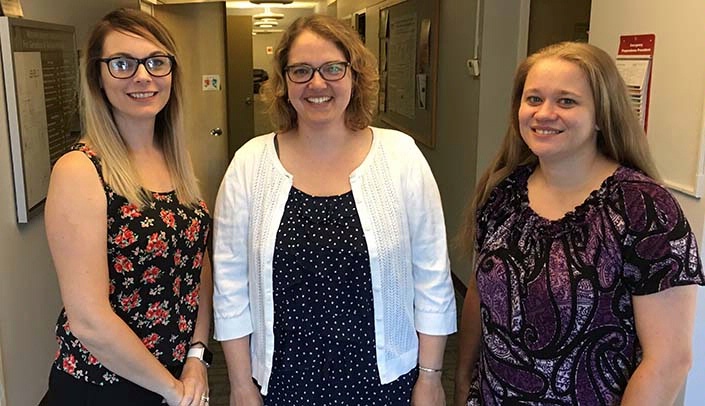The Family Care Enhancement Project is expanding.
The project, which has been under way since 2015, has parent resource coordinators (PRCs) located at One World Community Health Center, Charles Drew Community Health Center, Boys Town Pediatrics and Complete Children’s Health.
An emerging reseource
Having parent resource coordinators (or navigators) in clinics is starting to emerge other places as well, according to Swanson, such as the Children’s National Health System research team that received a $2 million grant from the Patient-Centered Outcomes Research Institute (PCORI) to study how parent navigators can help families and children with fragile medical conditions successfully manage the transition from the Neonatal Intensive Care Unit (NICU) to the home.
Additionally, Boston Medical Center is also using parent navigators to connect families recently diagnosed to autism to community resources. More medical systems are starting to look toward how they can innovate their care delivery as reimbursements move toward value based care.
“I think that we can help improve these child and family outcomes,” Swanson said. “We already are, but I’m going to be really anxious to see the results of the PCORI study.”
PRCs are parents of children who have disabilities or special health care needs, who receive additional training to help other families having children with disabilities access needed resources.
Now the project is expanding with the placement of two PRCs at the Munroe-Meyer Institute and another PRC placement at Kearney Clinic in Kearney, Neb., by the end of August.
The Family Care Enhancement Project was initiated with a grant from the state’s Early Intervention program, the Early Development Network. Other funding comes from the Nebraska Division of Public Health and also support from collaborating clinics.
Jennifer Hansen and Mandi Reinders are onsite at MMI partnering with clinicians to help connect families of children with disabilities get connected to needed services.
“We’re trying to be proactive, especially in the clinics,” Hansen said.
“It’s a new role, so not everybody knows that we’re here,” Reinders said.
“Oftentimes when a family learns their child has a disability, they don’t turn to their traditional family supports because their family members frequently don’t have knowledge of how to support them. That’s where we can help,” said Sarah Swanson, who oversees the project.
Swanson says that she considers Reinders and Hansen community health workers. “They are parents of children with disabilities themselves and have had to navigate the system. Because of that, they can build a trust with families and help to guide them to the resources they need.”
The two MMI PRCs help with community outreach — finding summer camps for children with special needs is a popular request, Hansen said — and help dealing with questions such as how to work with insurance companies to enable access to care or how to appeal denials.
“More and more research is showing us that the social determinants of health impact health outcomes,” Swanson said. “We find that families of children with disabilities often need to identify programs to help them pay for specialized providers or therapies or want to find community programs that allow their child a place to socialize. PRCs help families get connected to Medicaid, social security, economic assistance programs and support groups.
“It’s a way to help provide a holistic approach to care,” she said. “Often, families don’t know what the Early Development Network is, or they don’t understand the importance of early intervention and what it can do for them. So health literacy is also a part of this.”
“I think with having been in these situations before, we can empathize with how the parents are feeling and try to address the situation in a way that’s comfortable to them,” Hansen said.
“It adds a soft touch, because you have a doctor giving you a very clear-cut medical diagnosis,” said Reinders. “And we’re there to say, ‘Don’t worry — there are people out there, there are places you can go to help you along the way. It’s going to be OK.”
